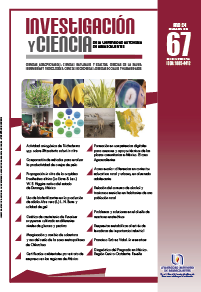Respuestas metabólicas al estrés de levaduras de importancia industrial
DOI:
https://doi.org/10.33064/iycuaa2016672789Palabras clave:
levadura, estrés, presión osmótica, temperatura, estrés oxidativoResumen
La producción de metabolitos y biomasa de levaduras a nivel industrial está generalmente sujeta a condiciones estresantes de cultivo, principalmente en cuanto a la concentración de oxígeno disuelto, presión osmótica, temperatura, pH y compuestos tóxicos como el etanol. Al ser las levaduras organismos unicelulares, los mecanismos para enfrentar estas situaciones de estrés se basan en cambios fisiológicos y de composición, así como toda una gama de respuestas de su metabolismo. En este trabajo se hace una revisión de las respuestas metabólicas en levaduras durante la producción a escala industrial de bebidas como el vino, así como las investigaciones básicas realizadas para elucidar las respuestas fisiológicas comunes usadas por estos microorganismos, con especial énfasis en la levadura Saccharomyces cerevisiae, que es por mucho la más importante a nivel industrial.
Descargas
Métricas
Citas
• ARELLANO PLAZA, M. et al. Respiratory capacity of the Kluyveromyces marxianus yeast isolated from the mezcal process during oxidative stress. World Journal Microbiology Biotechnology, 29(7): 1279-1287, 2013.
• BENJAPHOKEE, S. et al. Highly efficient bioethanol production by a Saccharomyces cerevisiae strain with multiple stress tolerance to high temperature, acid and ethanol. New Biotechnology, 29(3): 379-386, 2012.
• CARIDI, A. Effect of protectants on the fermentation performance of wine yeasts subjected to osmotic stress. Food Technolology and Biotechnology, 41(2): 145-148, 2003.
• CARRASCO, P. et al. Analysis of the stress resistance of commercial wine yeast strains. Archives of Microbiology, 175(6): 450-457, 2001.
• CIESAROVA, Z. et al. Enhancement of yeast ethanol tolerance by calcium and magnesium. Folia Microbiologica, 41(6): 485-488, 1996.
• FIORE, C. et al. Comparison between yeasts from grape and agave musts for traits of technological interest. World Journal of Microbiology and Biotechnology, 21(6): 1141-1147, 2005.
• GARAY ARROYO, A. et al. Response to different enviromental stress conditions of industrial and laboratory Saccharomyces cerevisiae strains. Applied Microbiology and Biotechnology, 63, 734-741, 2004.
• GARCÍA, M. et al. Comparative physiology of salt tolerance in Candida tropicalis and Saccharomyces cerevisiae. Microbiology, 143(4): 1125-1131, 1997.
• GIBSON, B. R. et al. Yeast responses to stresses associated with industrial brewery handling. FEMS Microbiology Reviews, 31(5): 535-569, 2007.
• HERRERO, E. et al. Redox control and oxidative stress in yeast cells. Biochimica et Biophysica Acta (BBA)-General Subjects, 1780(11): 1217-1235, 2008.
• HOLUBÁŘOVÁ, A. et al. A response of yeast cells to heat stress: cell viability and the stability of cytoskeletal structures. SCRIPTA MEDICA (BRNO), 73(6): 381-392, 2000.
• HOUNSA, C. et al. Role of trehalose in survival of Saccharomyces cerevisiae under osmotic stress. Microbiology, 144(3): 671-680, 1998.
• JAMIESON, D. J. Oxidative stress responses of the yeast Saccharomyces cerevisiae. Yeast, 14(16): 1511-1527, 1998.
• JIMÉNEZ MARTÍ, E. et al. Towards an understanding of the adaptation of wine yeasts to must : relevance of the osmotic stress response. Applied Microbiology and Biotechnology, 89(5): 1551-1561, 2011.
• KAINO, T. y TAKAGI, H. Gene expression profiles and intracellular contents of stress protectants in Saccharomyces cerevisiae under ethanol and sorbitol stresses. Applied Microbiology and Biotechnology, 79(2): 273-283, 2008.
• MODIG, T. et al. Anaerobic glycerol production by Saccharomyces cerevisiae strains under hyperosmotic stress. Applied Microbiology and Biotechnology, 75(2): 289-296, 2007.
• MORADAS FERREIRA, P. et al. The molecular defences against reactive oxygen species in yeast. Molecular Microbiology, 19(4): 651-658, 1996.
• PALMQVIST, E. y HAHN HÄGERDAL, B. Fermentation of lignocellulosic hydrolysates II : inhibitors and mechanisms of inhibition. Bioresource Technology, 74(1): 25-33, 2000.
• PERRONE, G. et al. Reactive oxygen species and yeast apoptosis. Biochimica et Biophysica Acta (BBA)-Molecular Cell Research, 1783(7): 1354-1368, 2008.
• SUN, Z. et al. Differential role of microenvironment in microencapsulation for improved cell tolerance to stress. Applied Microbiology and Biotechnology, 75(6): 1419-1427, 2007.
• SWIGERS, J. H. y PRETORIUS, I. S. Modulation of volatile sulfur compounds by wine yeast. Applied Microbiology and Biotechnology, 74(5): 954-960, 2007.
• TEKOLO, O. et al. The osmotic stress tolerance of basidiomycetous yeasts. FEMS Yeast Res., 10(4): 482-491, 2010.
• VILELA, A. et al. Reduction of volatile acidity of acidic wines by immobilized Saccharomyces cerevisiae cells. Applied Microbiology and Biotechnology, 97(11): 4991-5000, 2013.
• WALKER, G. M. Yeast Physiology and Biotechnology. West Sussex, England: John Wiley & Sons Ltd., 2000.
• ZHAO, H. et al. Improvement of oxidative stress tolerance in Saccharomyces cerevisiae through global transcription machinery engineering. Journal of Industrial Microbiology and Biotechnology, 41(5): 869-878, 2014.
• ZUZUARREGUI, A. y DEL OLMO, M. Analyses of stress resistance under laboratory conditions constitute a suitable criterion for wine yeast selection. Antonie van Leeuwenhoek, 85(4): 271- 280, 2004.
De páginas electrónicas
• WINTER, G. et al. Effects of rehydration nutrients on H2S metabolism and formation of volatile sulfur compounds by the wine yeast VL3. AMB Express, 2011. doi: 10.1186/2191-0855-1-36.
Descargas
Publicado
Cómo citar
Licencia
Las obras publicadas en versión electrónica de la revista están bajo la licencia Creative Commons Atribución-NoComercial-CompartirIgual 4.0 Internacional (CC BY-NC-SA 4.0)









